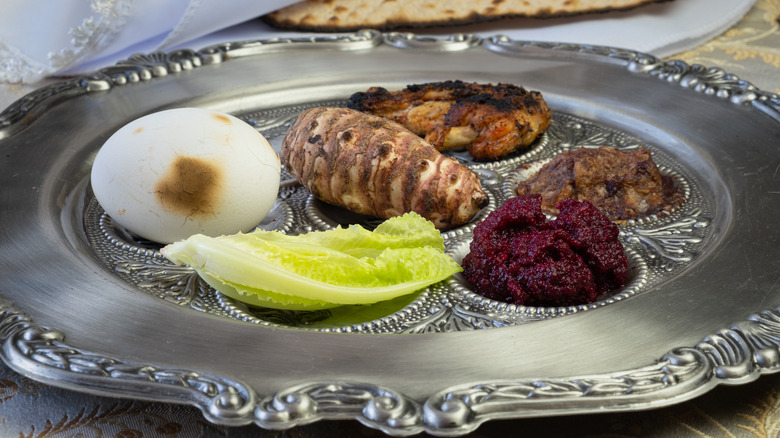The Long, Mysterious History Of Roasted Eggs
A traditional part of the Jewish Passover for some, ash-roasted eggs are made by cooking an egg in the ashes of a fire until it is done. Once popular throughout Europe and America, the practice of ash-roasting eggs has murky origins. Many today believe that the ash-roasting of eggs, also called ash-frozen eggs, dates back thousands of years. "Top Chef Canada" judge Chris Nuttall-Smith spoke about ash-roasted eggs on the Good Food podcast, saying, "They go back at least to Roman times. I think that's when the first record of ash-frozen eggs exists." He describes the practice, "You take an egg, you poke a little hole in the top to let expanding air come out so your eggs don't explode, and you just stick them in warm ashes from your fire." Then it's just about leaving the eggs in the ash until they're done to your liking.
Some claim that ash-roasted eggs were essential to the Jewish people escaping from Egypt, particularly given how long eggs can last before spoiling, and could be easily roasted in the ash of dying fires. While this is part of the reason roasted eggs are found at Passover Seders, there's no actual proof that the practice is as ancient as many believe. The first record of an ash-roasted egg being used at a Passover Seder dates back to the 16th Century. However, its popularity grew in the years that followed.
The rise and fall of the ash roasted egg
The practice of egg roasting was initially welcomed by upper-class society. For instance, William Shakespeare famously mentioned the art of ash-roasting eggs in his late 17th-century play "As You Like It" using a poorly-roasted egg as a jab. Later, the practice was observed by the Spanish during the Napoleonic Wars in the early 1800s.
However, over time, especially during the late 1800s and early 1900s, the practice of ash-roasting eggs fell out of practice for high society but was still observed among the less prosperous classes. In America, the practice also became popular among some enslaved Black people. A written account by Acie Thomas, a then-enslaved man in Florida, describes roasting and eating eggs in secret.
Around mid-way through the 1900s, ash-roasting eggs became a relic of a bygone era even among poorer groups. We can only speculate the exact reason, but it's possible that the highly accessible modern-day kitchen in the 1950s and 1960s hastened its decline as cooking outdoors became obsolete for many families across economic lines. It's also possible that the invention of ready-to-eat meals like TV dinners may have had an effect. So while you may find ash-roasted eggs at your next Passover Seder, it's not exactly a common preparation these days.

